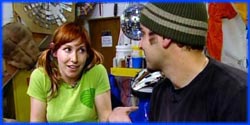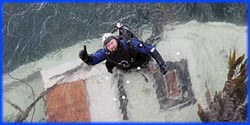


Premier Date: May 19, 2010
busted
The MythBusters first built a scale model of the slide and discovered that the concept was plausible. They then built the full size ramp with dimensions based on thorough analysis of the video. For safety reasons, the MythBusters built the slide next to a man-made lake so that they could avoid injury if they missed the target. After several runs, the MythBusters concluded that the 115 foot flight distance was impossible, as they could only travel at a maximum distance of 72 feet with a peak speed of 30 miles per hour. In order to achieve the 115 foot distance, they would need to be traveling at least forty miles per hour. They then tested the accuracy of the slide, and found that the accuracy was fairly high. However, because they couldn’t achieve the distance portion of the myth, they were forced to bust the myth. Just to make absolutely sure, the MythBusters contacted the people responsible for making the video, and they confirmed that the video was made using computer graphics.
confirmed
For their first test, the Build Team drove a regular size car on a controlled course. On the first run, they drove the car around a block using a left hand turn, but had to wait for a turn signal. In the second run, they instead took three right turns to bypass the signal, but the route was longer. The results showed that by taking only right hand turns, the car managed to cover more distance in less time while only consuming about 1% more fuel. For a more realistic result, the Build Team obtained a full size delivery truck and delivered packages to several locations throughout San Francisco. After driving a route that included some left hand turns, they repeated the exact same route, but replaced all of the left turns with right turns. After reviewing their results, the Build Team discovered that the right turn route was more fuel efficient by 3%, despite having to driver a longer distance. Kari then pointed out that this would be an ideal strategy for delivery trucks in urban environments, but would not work as well with regular cars.
Previous: Episode 144: Duct Tape Hour 2